Unit 2 I'll help to clean up the city parks Section A课件 (共56张PPT)
文档属性
| 名称 | Unit 2 I'll help to clean up the city parks Section A课件 (共56张PPT) | 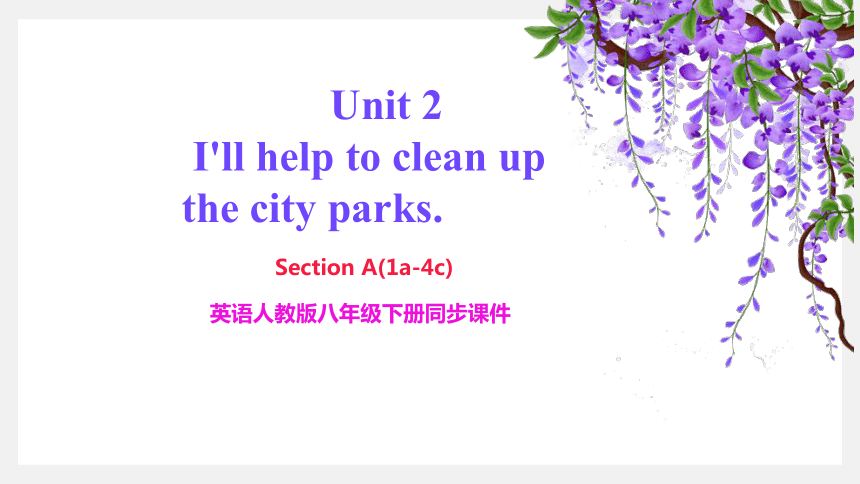 | |
| 格式 | zip | ||
| 文件大小 | 5.9MB | ||
| 资源类型 | 教案 | ||
| 版本资源 | 人教新目标(Go for it)版 | ||
| 科目 | 英语 | ||
| 更新时间 | 2020-07-28 22:30:37 | ||
图片预览

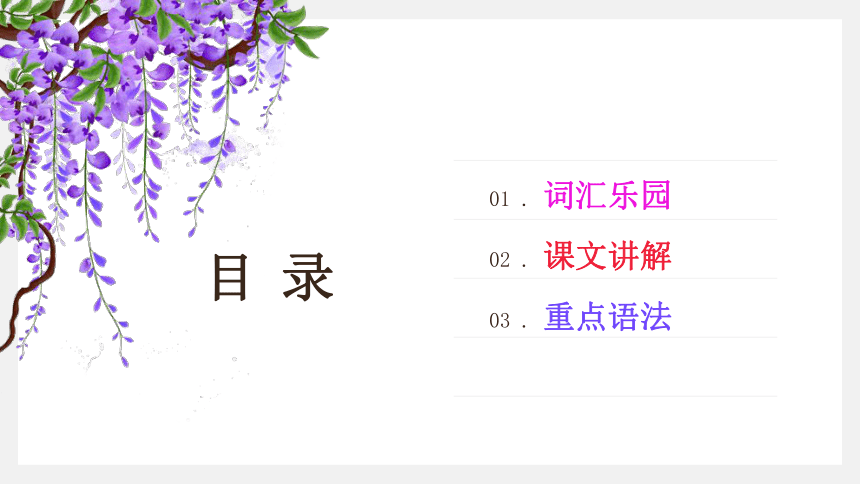
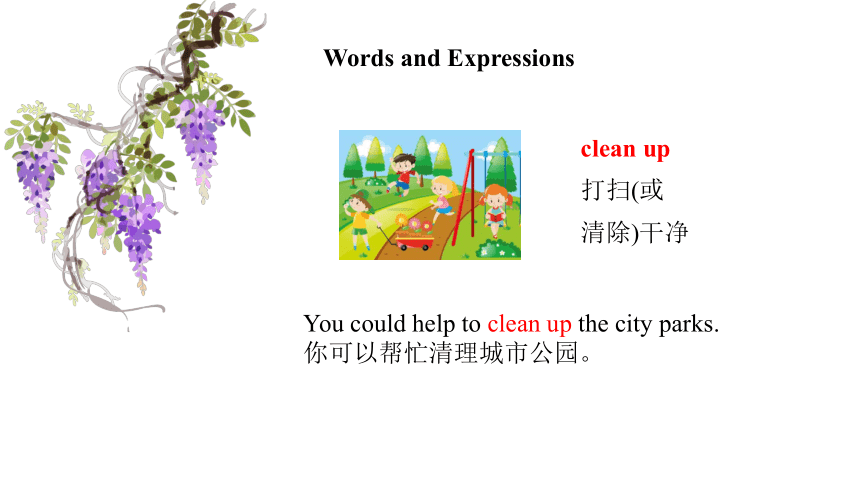

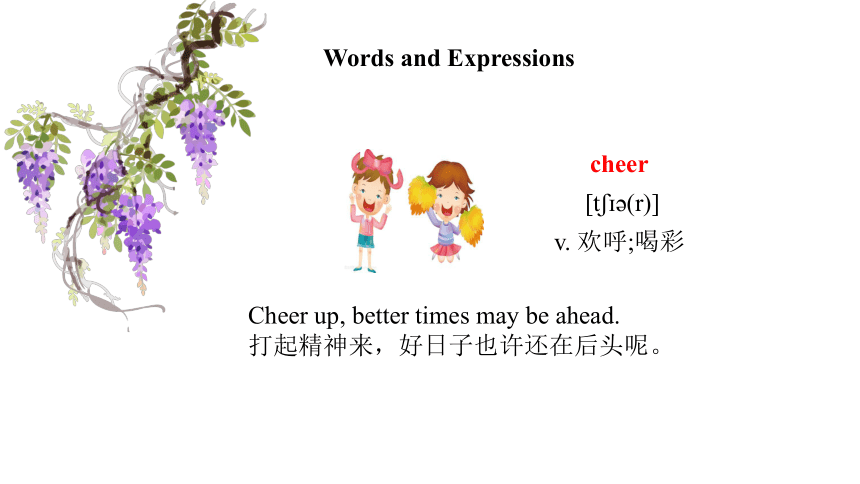
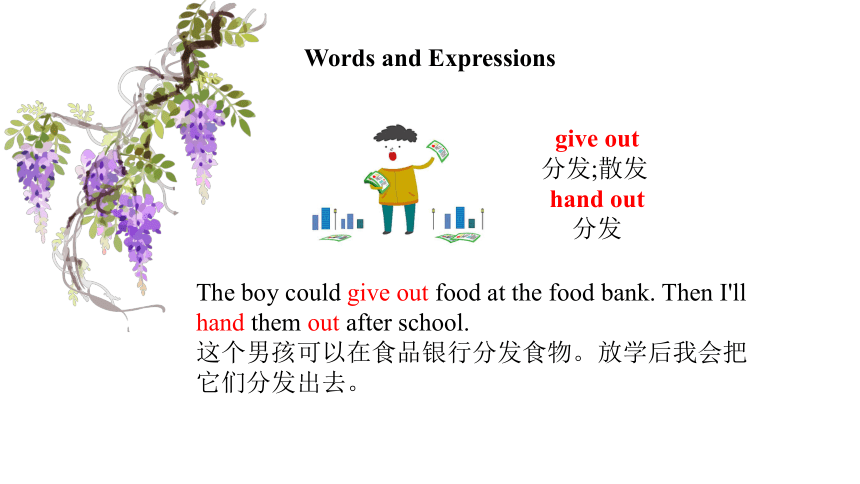
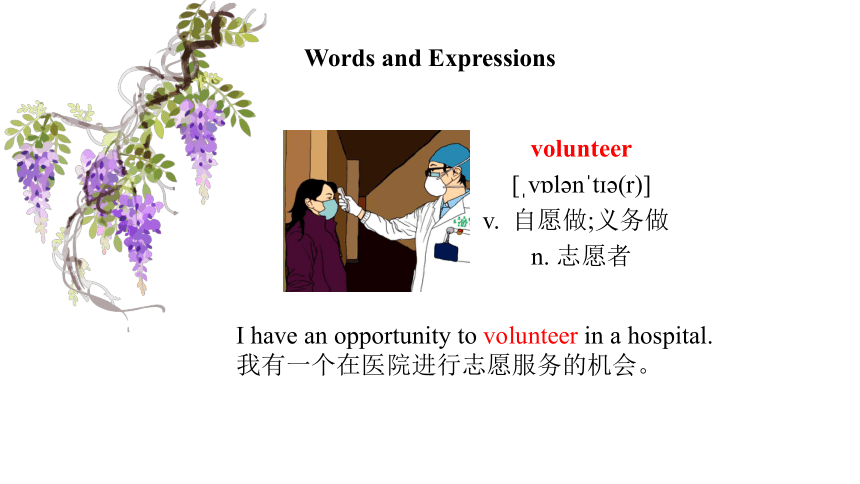
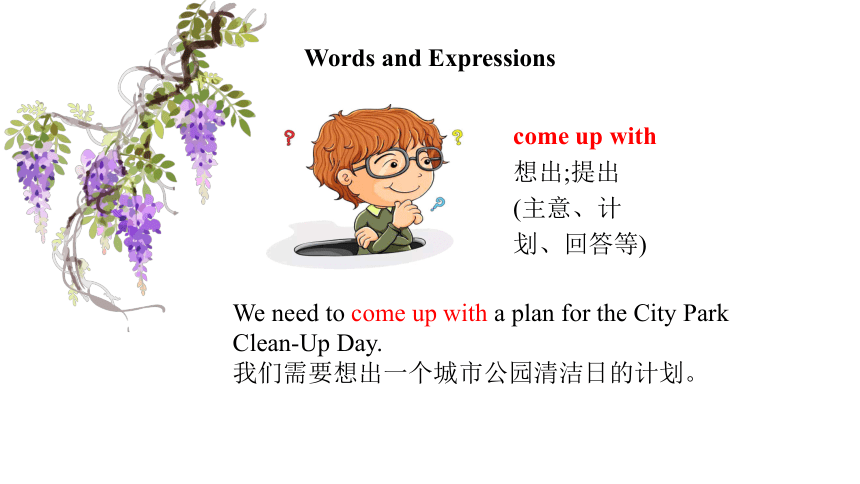
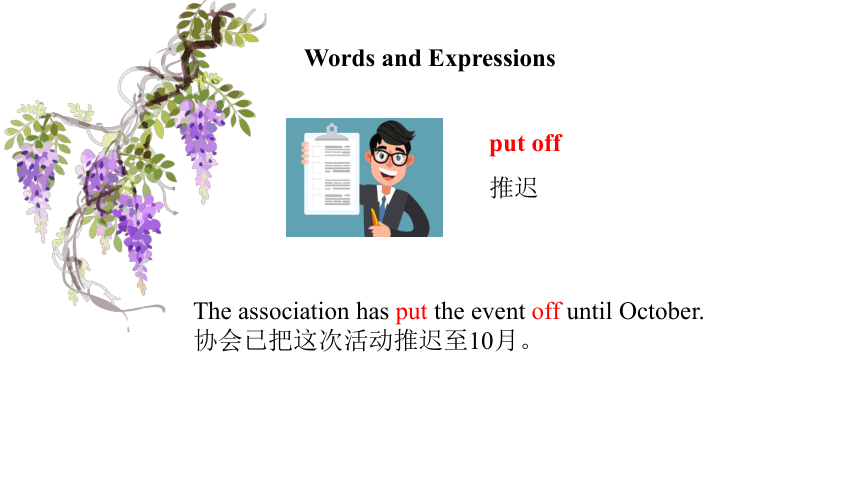
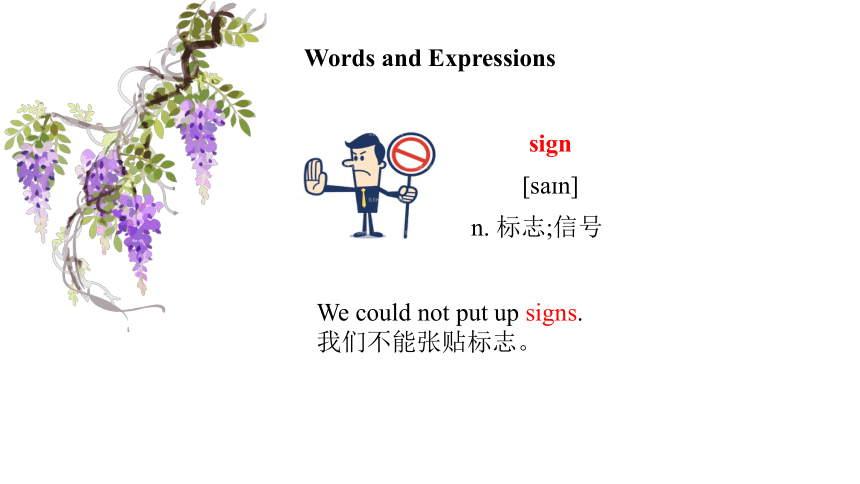
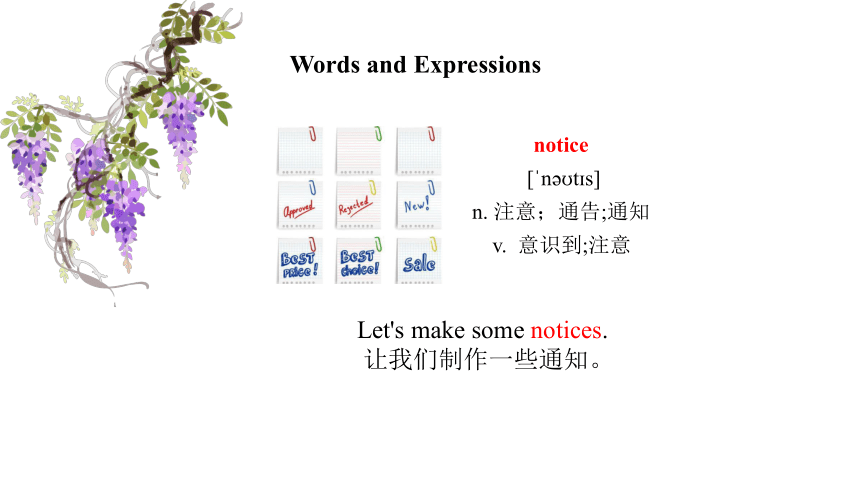
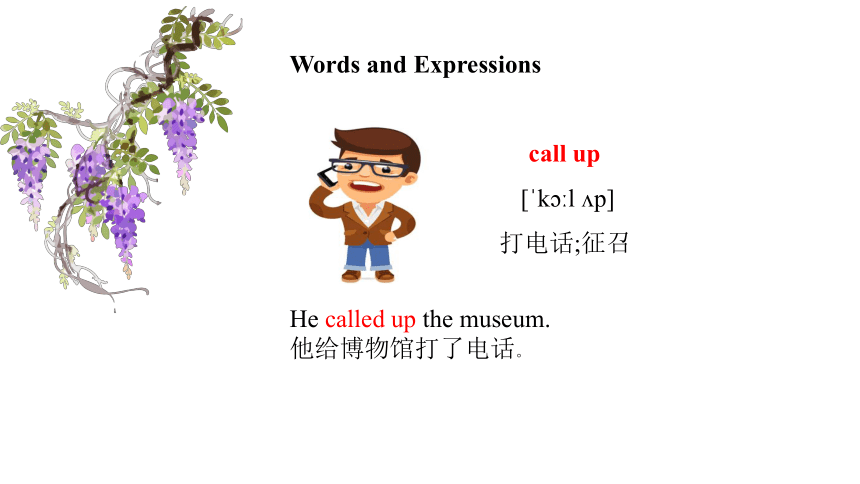
文档简介
(共56张PPT)
Unit
2
I'll
help
to
clean
up
the
city
parks.
Section
A(1a-4c)
英语人教版八年级下册同步课件
目录
01
.
词汇乐园
02
.
课文讲解
03
.
重点语法
clean
up
打扫(或
清除)干净
Words
and
Expressions
You
could
help
to
clean
up
the
city
parks.
你可以帮忙清理城市公园。
第一章
词汇乐园
Words
and
Expressions
cheer
[t???(r)]
v.
欢呼;喝彩
Cheer
up,
better
times
may
be
ahead.
打起精神来,好日子也许还在后头呢。
Words
and
Expressions
give
out
分发;散发
hand
out
分发
The
boy
could
give
out
food
at
the
food
bank.
Then
I'll
hand
them
out
after
school.
这个男孩可以在食品银行分发食物。放学后我会把它们分发出去。
Words
and
Expressions
volunteer
[?v?l?n?t??(r)]
v.
自愿做;义务做
n.
志愿者
I
have
an
opportunity
to
volunteer
in
a
hospital.
我有一个在医院进行志愿服务的机会。
Words
and
Expressions
come
up
with
想出;提出
(主意、计
划、回答等)
We
need
to
come
up
with
a
plan
for
the
City
Park
Clean-Up
Day.
我们需要想出一个城市公园清洁日的计划。
Words
and
Expressions
put
off
推迟
The
association
has
put
the
event
off
until
October.
协会已把这次活动推迟至10月。
Words
and
Expressions
sign
[sa?n]
n.
标志;信号
We
could
not
put
up
signs.
我们不能张贴标志。
Words
and
Expressions
notice
[?n??t?s]
n.
注意;通告;通知
v.
意识到;注意
Let's
make
some
notices.
让我们制作一些通知。
Words
and
Expressions
call
up
[?k??l
?p]
打电话;征召
He
called
up
the
museum.
他给博物馆打了电话。
Words
and
Expressions
They
told
me
stories
about
the
past
and
how
things
used
to
be.
他们给我讲了过去和过去的故事。
used
to
曾经...;
过去...
Words
and
Expressions
lonely
[?l??nli]
adj.
孤独的;
寂寞的
I
could
see
he
was
lonely.
我能看出他很寂寞。
care
for
照顾;非常喜欢
We
should
listen
to
them
and
care
for
them.
我们应该倾听并关心他们。
Words
and
Expressions
Words
and
Expressions
We
need
to
come
up
with
a
plan
for
the
City
Park
Clean-Up
Day.
我们需要想出一个计划为了城市公园清洁日。
come
up
with
想出;提出
(主意、计
划、回答等)
Words
and
Expressions
several
['sevral]
pron.几个;数个;
一些
Mario
Green
and
Mary
Brown
from
Riverside
High
School
give
up
several
hours
each
week
to
help
others.
来自河滨高中的马里奥·格林和玛丽·布朗每周空出几个小时帮助别人。
Words
and
Expressions
strong
[str??]
adj.强烈的;
强壮的
I
get
such
a
strong
feeling
of
satisfaction
when
I
see
the
animals
get
better.
当我看到动物好起来有一种强烈的满足感。
satisfaction
[?s?t?s?f?k?n]
n.满足;满意
Words
and
Expressions
joy
[d???]
n.高兴;愉快
I
get
the
look
of
joy
on
their
owners'
faces.
他们的主人脸上露出喜悦的表情。
owner
[???n?]
n.物主;主人
Words
and
Expressions
try
out
参加....选拨
She
decided
to
try
out
for
a
volunteer
after-school
reading
program.
她决定参加一个课外阅读志愿者计划。
Words
and
Expressions
journey
n.
(尤指长途)
旅行;行程
They're
going
on
a
different
journey
with
each
new
book.
他们每读一本新书就像在进行一次不同的旅行。
Words
and
Expressions
raise
[re?z]
v.募集;征集
We
can
raise
money
for
homeless
people.
我们可以为无家可归的人筹款。
Words
and
Expressions
alone
[??l??n]
adv.独自;单独
I
want
to
travel
alone.
我想独自去旅行。
Words
and
Expressions
辨析:alone,lonely
alone:经常做形容词,意为“单独的;独自的”,通常做句子的表语。强调客观情况,数量上只有一个。
例句:she
was
alone
in
the
classroom.
她独自一个人在教室。
lonely:用作形容词,意思为“孤独的;寂寞的”,指的是心灵上的孤独,带有伤感的色彩。
例句:I
could
see
she
was
lonely.
我能看出她很寂寞。
第二章
课文讲解
1.
Who
worked
at
the
old
people'
s
home
last
summer?
2.
Who's
going
to
help
the
old
people
there
this
summer?
Can
you
answer?
Helen:
Hi,
Tom.
I'm
making
some
plans
to
work
in
an
old
people's
home
this
summer.
Tom:
Really?
I
did
that
last
summer!
Helen:
Oh,
what
did
they
ask
you
to
help
out
with?
Tom:
Mm...things
like
reading
the
newspaper
to
the
old
people,
or
just
talking
to
them.
They
told
me
stories
about
the
past
and
how
things
used
to
be.
Helen:
That
sounds
interesting.
Tom:
Yeah,
a
lot
of
old
people
are
lonely.
We
should
listen
to
them
and
care
for
them.
Helen:
You're
right.
I
mean,
we
re
all
going
to
be
one
day,
too.
role-play
the
conversation.
海伦:嗨,汤姆。我正在制定今年夏天去老年之家工作工作的计划。
汤姆:真的吗?我去年夏天刚好在那里做过工作!
海伦:哦,他们让你帮了什么忙呢?
汤姆:嗯……像给老人读报之类的事情,或者只是和他们说话。他们给我讲了过去的故事以及过去的事情的情况。
海伦:听起来很有趣。
汤姆:是啊,很多老人都很孤独。我们应该倾听他们,关爱他们。
海伦:你说得对。我觉得,我们终有一天都会老去。
1.
Who
worked
at
the
old
people'
s
home
last
summer?
It's
Tom.
2.
Who's
going
to
help
the
old
people
there
this
summer?
Helen.
Can
you
answer?
They
told
me
stories
about
the
past
and
how
things
used
to
be.
他们给我讲过去的生活经历,讲过去是什么样子的。
used
to表示过去一度存在但现在已经消失的某一特定情形,意为“曾,曾经”。
例句:He
used
to
be
a
dancer.
他曾经是一名舞蹈家。
used
to还表示“过去常做某事,但现在不那样了”。
例句:She
used
to
arrive
late
month,
but
now
she
doesn't.
上个月她经常迟到,但是现在她不会了。
Target
Language
What
do
Mario
and
Mary
volunteer
to
do?
Read
the
article
and
answer
the
question.
Mario
Green
and
Mary
Brown
from
Riverside
High
School
give
up
several
hours
each
week
to
help
others.
Mario
loves
animals
and
wants
to
be
an
animal
doctor.
He
volunteers
at
an
animal
hospital
every
Saturday
morning.
Mario
believes
it
can
help
him
to
get
his
future
dream
job.
"It's
hard
work,"
he
says,“but
I
want
to
learn
more
about
how
to
care
for
animals.
I
get
such
a
strong
feeling
of
satisfaction
when
I
see
the
animals
get
better
and
the
look
of
joy
on
their
owners'
faces
.”
Students
Who
Volunteer
来自河边中学的马里奥.格林和玛丽。布朗每周都拿出几个小时去帮助别人。马里奥热爱动物并且想成为一名兽医。他每周六旱上都会在一家动物医院做义工。马里奥相信这能帮助他得到将来梦寐以求的工作。“这是(一项)艰苦的工作.”他说,“但我想学到更多关于如何照料动物的知识,当我看到动物们(病情)渐好,看到它们主人脸上的喜悦表情时,我产生出那么一种极强的满足感来。”
学生志愿者
1.give
up:放弃。这里可以意译为:“腾出时间”。
2.care
for:照顾。
3.
get:第一个“get”
意思是“产生;形成”;第二个“get”系动词,表示体质、情绪的改变。一般翻译成
“变得,变为”。
Mary
is
a
book
lover.
She
could
read
by
herself
at
the
age
of
four.
Last
year,
she
decided
to
try
out
for
a
volunteer
after-school
reading
program
She
still
works
there
once
a
week
to
help
kids
learn
to
read.
"The
kids
are
sitting
in
the
library,
but
you
can
see
in
their
eyes
that
they're
going
on
a
different
journey
with
each
new
book.Volunteering
here
is
a
dream
come
true
for
me.
I
can
do
what
I
love
to
do
and
help
others
at
the
same
time.
Students
Who
Volunteer
玛丽是一位读书爱好者。她在四岁时就能够独自看书了。去年,她决定参加课后阅读课程处的志愿者选拔。她仍然每周一次到那里帮助孩子们学习阅读。孩子们都坐在图书馆里,但是你可以从他们的眼睛里看到,他们每读一本新书就像在进行一次不同的旅行。在这里当志愿者对我来说是梦想成真。我可以做我喜欢做的事情,同时帮助别人。
1.She
could
read
by
herself
at
the
age
of
four.
她在四岁时就能独立看书了。
by+反身代词意为“独自地;独立地”,常与动词或动词短语连用,作句子的方式状语。
2.Volunteering
here
is
a
dream
come
true
for
me.
这句话由动名词做主语。单个动名词(短语)作主语的时候谓语动词用第三人称的单数形式。
3.a
dream
come
true.意思是:“梦想成为现实,梦想成真”。
What
do
Mario
and
Mary
volunteer
to
do?
Read
the
article.
Mario
volunteers
at
an
animal
hospital
every
Saturday
morning.
Mary
volunteers
in
an
after-school
reading
program
to
help
kids
learn
to
read.
1.Why
do
Mario
and
Mary
volunteer
to
help
others?
Read
the
article
again
and
answer
the
questions.
Mario
volunteers
because
he
be
animals
loves
animals
and
wants
to
be
an
animal
doctor.
Mary
volunteers
because
she
love
to
loves
books
and
enjoys
helping
others
a
kids
learn
to
read.
Mario
says
volunteering
is
hard
work,
but
he
can
get
a
strong
satisfaction
from
it.
Mary
says
volunteering
is
a
dream
come
true
for
her.
She
can
do
what
she
loves
to
do
and
help
others
at
the
same
time.
Read
the
article
again
and
answer
the
questions.
2.What
do
they
say
about
volunteering?
1.
Mario
would
like
to
be
an
animal
doctor.
2.
Mario
works
for
an
animal
hospital
because
he
wants
to
learn
about
how
to
care
for
animals.
3.Mary
decided
to
try
out
for
a
job
at
an
after-school
reading
program
last
year.
She
still
works
there
now
to
help
kids
learn
to
read.
1
4.Mary
has
a
dream
job
because
she
can
do
I
what
she
loves
to
do
.
Use
infinitives
to
complete
the
sentences
below.
第三章
重点语法
1.动词不定式的基本形式是“to+
动词原形",有时可以不带to。
例句:He
decides
to
leave
Chengdu.
2.否定结构是“not
to+动词原形”。它在句中不能做谓语,且形式不随主语变化而变化。
We
decide
not
to
leave
Chengdu.
动词不定式的含义
动词不定式作宾语,表明意图、希望或决定的内容。
常用结构一:动词+动词不定式,这类动词包括:
want,
hope,
learn,
decide,
agree,expect,
choose,
would
like,
plan,
fail;
forget
等。
例句:We
want
to
play
football.
动词不定式作宾语
常用结构二:动词+疑问词+动词不定式
这类动词有:
know,
think,
decide,
guess,
find
out,
understand等。
疑问词有:
what,
which,
how,
where,
when等例句:She
doesn't
know
what
to
do.
动词不定式作宾语
常用结构三:动词+形容词+动词不定式其中心为形式宾语,动词不定式为真正的宾语,常见的这类动词有think,
feel,find,
consider等。
1
find
it
useful
to
learn
English
well.
动词不定式作宾语
动词不定式作状语时:
用法一:可放在句首或句尾表示目的。
To
catch
the
plane,
she
got
up
early.=
She
got
up
early
to
catch
the
train.
不定式作状语时:
用法二:可跟在作表语的形容词或过去分词后面,作原因状语。
I'm
sorry
to
hear
that.
动词不定工作状语
动词不定式作状语时:
用法三:可用在too...
to...结构中,作结果
状语。
Mary
is
too
young
to
understand
the
meaning.
动词不定式作状语
1.在“动词+宾语+to
do"结构中,
句中的不定式作宾语补足语。常见的动词有ask
tell,
want,
expect,
like,
wish等。
She
asked
Jim
to
talk
about
English
grammar
study.
2.有些动词的宾语补足语通常不带to,使用“动词+宾语+do"的结构。这一类是感官动词,如see,
feel,
hear,
notice,
watch等。
He
saw
her
enter
the
classroom.
3.动词不定式作宾语补足语有些动词的宾语补足语通常不带to,使用“动词+宾语+do"的结构。另一类是使役动词,如let,
make,
have等。
The
boss
made
the
staff
work
9
hours
a
day.
动词不定式作宾语补足语
Fill
in
the
blanks
with
the
phrasal
verbs
in
the
box.
put
up
hand
out
call
up
cheer
up
put
off
come
up
with
give
out
1.
I
want
to
put
off
plan
to
work
in
an
animal
hospital
until
next
summer.
I'm
too
busy
with
my
studies
this
year.
2.
She
hopes
call
up
at
least
five
primary
schools
to
ask
if
they
need
Volunteers
for
their
after
school
programs.
3.Our
class
is
trying
to
come
up
with
some
ideas
to
cheer
up
sick
children
because
they
are
often
sad.
4.
We
decided
to
put
up
signs
around
the
school
and
hand
out
notices
to
tell
students
about
the
book
sale.
We
will
give
out
the
money
from
the
sale
to
homeless
people.
Most
people
today
are
only
worried
about
getting
good
jobs
to
make
lots
of
money.
In
their
free
time,
I
they
think
about
what
to
do
for
fun.
However,
few
people
think
about
what
they
can
do
to
help
others.
There
are
many
people
who
are
less
lucky
than
us.Volunteering
our
time
to
help
these
people
is
a
good
way
to
spend
our
free
time.
Fill
in
the
blanks
with
the
correct
forms
of
the
verbs
in
the
box.
help
move
do
make
visit
spend
For
example,
we
can
make
plans
to
visit
sick
children
in
the
hospital
or
raise
money
for
homeless
people.
Some
people
even
stop
doing
their
jobs
for
few
months
to
a
year
to
move
to
another
place,
like
one
of
the
countries
in
Africa,
and
help
people
there.
Fill
in
the
blanks
with
the
correct
forms
of
verbs
in
the
box.
help
move
do
make
visit
spend
1.
I'd
like
to
volunteer_______.
I'd
like
to
volunteer
at
the
food
bank
and
help
to
give
out
food
to
homeless
people.
2.
At
12:00
midnight,
1
called
my
friend
______.
At
12:00
midnight.1
called
my
fiend
to
ask
him
an
important
question.
Complete
the
sentences
with
your
own
ideas.
Use
infinitives.
Complete
the
sentences
with
your
own
ideas.
Use
infinitives.
3.
I'm
very
busy
but
I
could
help__________.
I'm
very
busy
but
I
could
help
to
paint
the
house
for
a
few
hours
tomorrow.
4.
Summer
vacation
is
coming,
and
I
want_________.
Summer
vacation
is
coming,
and
1
want
to
visit
my
grandparents
in
Hunan.
5.
1
want
to
travel
alone.
My
parents
told
me
(not)_______-.
1
want
to
travel
alone.
My
parents
told
me
not
to
do
that
because
lam
too
young
and
it
is
not
safe,
see
you
!
Unit
2
I'll
help
to
clean
up
the
city
parks.
Section
A(1a-4c)
英语人教版八年级下册同步课件
目录
01
.
词汇乐园
02
.
课文讲解
03
.
重点语法
clean
up
打扫(或
清除)干净
Words
and
Expressions
You
could
help
to
clean
up
the
city
parks.
你可以帮忙清理城市公园。
第一章
词汇乐园
Words
and
Expressions
cheer
[t???(r)]
v.
欢呼;喝彩
Cheer
up,
better
times
may
be
ahead.
打起精神来,好日子也许还在后头呢。
Words
and
Expressions
give
out
分发;散发
hand
out
分发
The
boy
could
give
out
food
at
the
food
bank.
Then
I'll
hand
them
out
after
school.
这个男孩可以在食品银行分发食物。放学后我会把它们分发出去。
Words
and
Expressions
volunteer
[?v?l?n?t??(r)]
v.
自愿做;义务做
n.
志愿者
I
have
an
opportunity
to
volunteer
in
a
hospital.
我有一个在医院进行志愿服务的机会。
Words
and
Expressions
come
up
with
想出;提出
(主意、计
划、回答等)
We
need
to
come
up
with
a
plan
for
the
City
Park
Clean-Up
Day.
我们需要想出一个城市公园清洁日的计划。
Words
and
Expressions
put
off
推迟
The
association
has
put
the
event
off
until
October.
协会已把这次活动推迟至10月。
Words
and
Expressions
sign
[sa?n]
n.
标志;信号
We
could
not
put
up
signs.
我们不能张贴标志。
Words
and
Expressions
notice
[?n??t?s]
n.
注意;通告;通知
v.
意识到;注意
Let's
make
some
notices.
让我们制作一些通知。
Words
and
Expressions
call
up
[?k??l
?p]
打电话;征召
He
called
up
the
museum.
他给博物馆打了电话。
Words
and
Expressions
They
told
me
stories
about
the
past
and
how
things
used
to
be.
他们给我讲了过去和过去的故事。
used
to
曾经...;
过去...
Words
and
Expressions
lonely
[?l??nli]
adj.
孤独的;
寂寞的
I
could
see
he
was
lonely.
我能看出他很寂寞。
care
for
照顾;非常喜欢
We
should
listen
to
them
and
care
for
them.
我们应该倾听并关心他们。
Words
and
Expressions
Words
and
Expressions
We
need
to
come
up
with
a
plan
for
the
City
Park
Clean-Up
Day.
我们需要想出一个计划为了城市公园清洁日。
come
up
with
想出;提出
(主意、计
划、回答等)
Words
and
Expressions
several
['sevral]
pron.几个;数个;
一些
Mario
Green
and
Mary
Brown
from
Riverside
High
School
give
up
several
hours
each
week
to
help
others.
来自河滨高中的马里奥·格林和玛丽·布朗每周空出几个小时帮助别人。
Words
and
Expressions
strong
[str??]
adj.强烈的;
强壮的
I
get
such
a
strong
feeling
of
satisfaction
when
I
see
the
animals
get
better.
当我看到动物好起来有一种强烈的满足感。
satisfaction
[?s?t?s?f?k?n]
n.满足;满意
Words
and
Expressions
joy
[d???]
n.高兴;愉快
I
get
the
look
of
joy
on
their
owners'
faces.
他们的主人脸上露出喜悦的表情。
owner
[???n?]
n.物主;主人
Words
and
Expressions
try
out
参加....选拨
She
decided
to
try
out
for
a
volunteer
after-school
reading
program.
她决定参加一个课外阅读志愿者计划。
Words
and
Expressions
journey
n.
(尤指长途)
旅行;行程
They're
going
on
a
different
journey
with
each
new
book.
他们每读一本新书就像在进行一次不同的旅行。
Words
and
Expressions
raise
[re?z]
v.募集;征集
We
can
raise
money
for
homeless
people.
我们可以为无家可归的人筹款。
Words
and
Expressions
alone
[??l??n]
adv.独自;单独
I
want
to
travel
alone.
我想独自去旅行。
Words
and
Expressions
辨析:alone,lonely
alone:经常做形容词,意为“单独的;独自的”,通常做句子的表语。强调客观情况,数量上只有一个。
例句:she
was
alone
in
the
classroom.
她独自一个人在教室。
lonely:用作形容词,意思为“孤独的;寂寞的”,指的是心灵上的孤独,带有伤感的色彩。
例句:I
could
see
she
was
lonely.
我能看出她很寂寞。
第二章
课文讲解
1.
Who
worked
at
the
old
people'
s
home
last
summer?
2.
Who's
going
to
help
the
old
people
there
this
summer?
Can
you
answer?
Helen:
Hi,
Tom.
I'm
making
some
plans
to
work
in
an
old
people's
home
this
summer.
Tom:
Really?
I
did
that
last
summer!
Helen:
Oh,
what
did
they
ask
you
to
help
out
with?
Tom:
Mm...things
like
reading
the
newspaper
to
the
old
people,
or
just
talking
to
them.
They
told
me
stories
about
the
past
and
how
things
used
to
be.
Helen:
That
sounds
interesting.
Tom:
Yeah,
a
lot
of
old
people
are
lonely.
We
should
listen
to
them
and
care
for
them.
Helen:
You're
right.
I
mean,
we
re
all
going
to
be
one
day,
too.
role-play
the
conversation.
海伦:嗨,汤姆。我正在制定今年夏天去老年之家工作工作的计划。
汤姆:真的吗?我去年夏天刚好在那里做过工作!
海伦:哦,他们让你帮了什么忙呢?
汤姆:嗯……像给老人读报之类的事情,或者只是和他们说话。他们给我讲了过去的故事以及过去的事情的情况。
海伦:听起来很有趣。
汤姆:是啊,很多老人都很孤独。我们应该倾听他们,关爱他们。
海伦:你说得对。我觉得,我们终有一天都会老去。
1.
Who
worked
at
the
old
people'
s
home
last
summer?
It's
Tom.
2.
Who's
going
to
help
the
old
people
there
this
summer?
Helen.
Can
you
answer?
They
told
me
stories
about
the
past
and
how
things
used
to
be.
他们给我讲过去的生活经历,讲过去是什么样子的。
used
to表示过去一度存在但现在已经消失的某一特定情形,意为“曾,曾经”。
例句:He
used
to
be
a
dancer.
他曾经是一名舞蹈家。
used
to还表示“过去常做某事,但现在不那样了”。
例句:She
used
to
arrive
late
month,
but
now
she
doesn't.
上个月她经常迟到,但是现在她不会了。
Target
Language
What
do
Mario
and
Mary
volunteer
to
do?
Read
the
article
and
answer
the
question.
Mario
Green
and
Mary
Brown
from
Riverside
High
School
give
up
several
hours
each
week
to
help
others.
Mario
loves
animals
and
wants
to
be
an
animal
doctor.
He
volunteers
at
an
animal
hospital
every
Saturday
morning.
Mario
believes
it
can
help
him
to
get
his
future
dream
job.
"It's
hard
work,"
he
says,“but
I
want
to
learn
more
about
how
to
care
for
animals.
I
get
such
a
strong
feeling
of
satisfaction
when
I
see
the
animals
get
better
and
the
look
of
joy
on
their
owners'
faces
.”
Students
Who
Volunteer
来自河边中学的马里奥.格林和玛丽。布朗每周都拿出几个小时去帮助别人。马里奥热爱动物并且想成为一名兽医。他每周六旱上都会在一家动物医院做义工。马里奥相信这能帮助他得到将来梦寐以求的工作。“这是(一项)艰苦的工作.”他说,“但我想学到更多关于如何照料动物的知识,当我看到动物们(病情)渐好,看到它们主人脸上的喜悦表情时,我产生出那么一种极强的满足感来。”
学生志愿者
1.give
up:放弃。这里可以意译为:“腾出时间”。
2.care
for:照顾。
3.
get:第一个“get”
意思是“产生;形成”;第二个“get”系动词,表示体质、情绪的改变。一般翻译成
“变得,变为”。
Mary
is
a
book
lover.
She
could
read
by
herself
at
the
age
of
four.
Last
year,
she
decided
to
try
out
for
a
volunteer
after-school
reading
program
She
still
works
there
once
a
week
to
help
kids
learn
to
read.
"The
kids
are
sitting
in
the
library,
but
you
can
see
in
their
eyes
that
they're
going
on
a
different
journey
with
each
new
book.Volunteering
here
is
a
dream
come
true
for
me.
I
can
do
what
I
love
to
do
and
help
others
at
the
same
time.
Students
Who
Volunteer
玛丽是一位读书爱好者。她在四岁时就能够独自看书了。去年,她决定参加课后阅读课程处的志愿者选拔。她仍然每周一次到那里帮助孩子们学习阅读。孩子们都坐在图书馆里,但是你可以从他们的眼睛里看到,他们每读一本新书就像在进行一次不同的旅行。在这里当志愿者对我来说是梦想成真。我可以做我喜欢做的事情,同时帮助别人。
1.She
could
read
by
herself
at
the
age
of
four.
她在四岁时就能独立看书了。
by+反身代词意为“独自地;独立地”,常与动词或动词短语连用,作句子的方式状语。
2.Volunteering
here
is
a
dream
come
true
for
me.
这句话由动名词做主语。单个动名词(短语)作主语的时候谓语动词用第三人称的单数形式。
3.a
dream
come
true.意思是:“梦想成为现实,梦想成真”。
What
do
Mario
and
Mary
volunteer
to
do?
Read
the
article.
Mario
volunteers
at
an
animal
hospital
every
Saturday
morning.
Mary
volunteers
in
an
after-school
reading
program
to
help
kids
learn
to
read.
1.Why
do
Mario
and
Mary
volunteer
to
help
others?
Read
the
article
again
and
answer
the
questions.
Mario
volunteers
because
he
be
animals
loves
animals
and
wants
to
be
an
animal
doctor.
Mary
volunteers
because
she
love
to
loves
books
and
enjoys
helping
others
a
kids
learn
to
read.
Mario
says
volunteering
is
hard
work,
but
he
can
get
a
strong
satisfaction
from
it.
Mary
says
volunteering
is
a
dream
come
true
for
her.
She
can
do
what
she
loves
to
do
and
help
others
at
the
same
time.
Read
the
article
again
and
answer
the
questions.
2.What
do
they
say
about
volunteering?
1.
Mario
would
like
to
be
an
animal
doctor.
2.
Mario
works
for
an
animal
hospital
because
he
wants
to
learn
about
how
to
care
for
animals.
3.Mary
decided
to
try
out
for
a
job
at
an
after-school
reading
program
last
year.
She
still
works
there
now
to
help
kids
learn
to
read.
1
4.Mary
has
a
dream
job
because
she
can
do
I
what
she
loves
to
do
.
Use
infinitives
to
complete
the
sentences
below.
第三章
重点语法
1.动词不定式的基本形式是“to+
动词原形",有时可以不带to。
例句:He
decides
to
leave
Chengdu.
2.否定结构是“not
to+动词原形”。它在句中不能做谓语,且形式不随主语变化而变化。
We
decide
not
to
leave
Chengdu.
动词不定式的含义
动词不定式作宾语,表明意图、希望或决定的内容。
常用结构一:动词+动词不定式,这类动词包括:
want,
hope,
learn,
decide,
agree,expect,
choose,
would
like,
plan,
fail;
forget
等。
例句:We
want
to
play
football.
动词不定式作宾语
常用结构二:动词+疑问词+动词不定式
这类动词有:
know,
think,
decide,
guess,
find
out,
understand等。
疑问词有:
what,
which,
how,
where,
when等例句:She
doesn't
know
what
to
do.
动词不定式作宾语
常用结构三:动词+形容词+动词不定式其中心为形式宾语,动词不定式为真正的宾语,常见的这类动词有think,
feel,find,
consider等。
1
find
it
useful
to
learn
English
well.
动词不定式作宾语
动词不定式作状语时:
用法一:可放在句首或句尾表示目的。
To
catch
the
plane,
she
got
up
early.=
She
got
up
early
to
catch
the
train.
不定式作状语时:
用法二:可跟在作表语的形容词或过去分词后面,作原因状语。
I'm
sorry
to
hear
that.
动词不定工作状语
动词不定式作状语时:
用法三:可用在too...
to...结构中,作结果
状语。
Mary
is
too
young
to
understand
the
meaning.
动词不定式作状语
1.在“动词+宾语+to
do"结构中,
句中的不定式作宾语补足语。常见的动词有ask
tell,
want,
expect,
like,
wish等。
She
asked
Jim
to
talk
about
English
grammar
study.
2.有些动词的宾语补足语通常不带to,使用“动词+宾语+do"的结构。这一类是感官动词,如see,
feel,
hear,
notice,
watch等。
He
saw
her
enter
the
classroom.
3.动词不定式作宾语补足语有些动词的宾语补足语通常不带to,使用“动词+宾语+do"的结构。另一类是使役动词,如let,
make,
have等。
The
boss
made
the
staff
work
9
hours
a
day.
动词不定式作宾语补足语
Fill
in
the
blanks
with
the
phrasal
verbs
in
the
box.
put
up
hand
out
call
up
cheer
up
put
off
come
up
with
give
out
1.
I
want
to
put
off
plan
to
work
in
an
animal
hospital
until
next
summer.
I'm
too
busy
with
my
studies
this
year.
2.
She
hopes
call
up
at
least
five
primary
schools
to
ask
if
they
need
Volunteers
for
their
after
school
programs.
3.Our
class
is
trying
to
come
up
with
some
ideas
to
cheer
up
sick
children
because
they
are
often
sad.
4.
We
decided
to
put
up
signs
around
the
school
and
hand
out
notices
to
tell
students
about
the
book
sale.
We
will
give
out
the
money
from
the
sale
to
homeless
people.
Most
people
today
are
only
worried
about
getting
good
jobs
to
make
lots
of
money.
In
their
free
time,
I
they
think
about
what
to
do
for
fun.
However,
few
people
think
about
what
they
can
do
to
help
others.
There
are
many
people
who
are
less
lucky
than
us.Volunteering
our
time
to
help
these
people
is
a
good
way
to
spend
our
free
time.
Fill
in
the
blanks
with
the
correct
forms
of
the
verbs
in
the
box.
help
move
do
make
visit
spend
For
example,
we
can
make
plans
to
visit
sick
children
in
the
hospital
or
raise
money
for
homeless
people.
Some
people
even
stop
doing
their
jobs
for
few
months
to
a
year
to
move
to
another
place,
like
one
of
the
countries
in
Africa,
and
help
people
there.
Fill
in
the
blanks
with
the
correct
forms
of
verbs
in
the
box.
help
move
do
make
visit
spend
1.
I'd
like
to
volunteer_______.
I'd
like
to
volunteer
at
the
food
bank
and
help
to
give
out
food
to
homeless
people.
2.
At
12:00
midnight,
1
called
my
friend
______.
At
12:00
midnight.1
called
my
fiend
to
ask
him
an
important
question.
Complete
the
sentences
with
your
own
ideas.
Use
infinitives.
Complete
the
sentences
with
your
own
ideas.
Use
infinitives.
3.
I'm
very
busy
but
I
could
help__________.
I'm
very
busy
but
I
could
help
to
paint
the
house
for
a
few
hours
tomorrow.
4.
Summer
vacation
is
coming,
and
I
want_________.
Summer
vacation
is
coming,
and
1
want
to
visit
my
grandparents
in
Hunan.
5.
1
want
to
travel
alone.
My
parents
told
me
(not)_______-.
1
want
to
travel
alone.
My
parents
told
me
not
to
do
that
because
lam
too
young
and
it
is
not
safe,
see
you
!
同课章节目录
- Unit 1 What's the matter?
- Section A
- Section B
- Unit 2 I'll help to clean up the city parks.
- Section A
- Section B
- Unit 3 Could you please clean your room?
- Section A
- Section B
- Unit 4 Why don't you talk to your parents?
- Section A
- Section B
- Unit 5 What were you doing when the rainstorm came
- Section A
- Section B
- Review of Units 1-5
- Unit 6 An old man tried to move the mountains.
- Section A
- Section B
- Unit 7 What's the highest mountain in the world?
- Section A
- Section B
- Unit 8 Have you read Treasure Island yet?
- Section A
- Section B
- Unit 9 Have you ever been to a museum?
- Section A
- Section B
- Unit 10 I've had this bike for three years.
- Section A
- Section B
